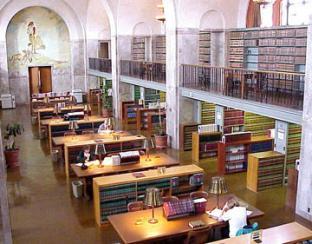State Library
State Library
P.O. Box 98931
Lincoln, NE 68509
Permanent Physical Address:
325 State Capitol
1445 K Street
Lincoln, NE 68509
Phone: (402) 471-3189
E-mail: NSC.lawlibrary@nejudicial.gov
The library is open Monday - Friday from 8:00am - 4:30pm, and will be closed on all state holidays.
ANNOUNCEMENTS
- We are now open to the general public, without appointment, in the Capitol Building.
- Virtual reference assistance is still encouraged and available during regular business hours.
Please send all reference requests to NSC.lawlibrary@nejudicial.gov
The Nebraska State Library is the oldest public library in the state. In 1855 (before the territory of Nebraska became a state), Congress appropriated monies to the territory of Nebraska for library resources. In 1871, the Nebraska Legislature enacted a statute specifically relating to the creation of the Nebraska State Library. The Library was separated into two sections, law and miscellaneous. The Legislature named the Clerk of the Supreme Court as the librarian, and the judges of the Nebraska Supreme Court as the board of directors of the law collection. The Secretary of State was the librarian for the miscellaneous collection and the Governor, Secretary of State and Auditor as the board of directors for the miscellaneous collection. Both collections were put under the supervision of the Supreme Court in 1913. In 1968, the miscellaneous collection was given to other libraries, leaving only the law books in the State Library. At the present time, the Nebraska State Library contains approximately 130,000 volumes. The shelving in the library, if placed end-to-end, would make one continuous shelf nearly six miles long. The Nebraska State Library serves the needs of the Nebraska Supreme Court, the Nebraska Court of Appeals, attorneys within the State of Nebraska, members of the Nebraska Legislature and their respective staffs, members of other state agencies, pro se litigants, and interested members of the general public. The Nebraska State Library is primarily a reference/research library as opposed to a circulating library.
The Nebraska State Library takes telephone, fax, and e-mail requests for copies of materials in the library collection for patrons outside of the Lincoln area, including state agencies. For members of the public needing copies mailed to them, the library requests that payment for copies and postage be made in advance. All copies shall be subject to U.S. copyright laws.
Policies of the State Library
Circulation Policy
While the Nebraska State Library is primarily a research rather than a circulating library, certain materials may be checked out and used by members of the Nebraska State Bar Association and employees of state agencies. Contact the library for more specific checkout policies.
Scanning and Printing Services
In accordance with the copyright laws of the United States, library materials may be reproduced. The library provides scanning services free of charge. Documents are sent via email or can be saved to the patron’s USB flash drive. Although the library no longer has a copy machine, you can request your scans be printed out for 25 cents per page. The library will only accept check or cash. Library staff does not make change for use in printouts, so to avoid disappointment, patrons should come with an ample supply of quarters and dollar bills. Print charges must be paid before the print job is released.
Public Terminal Policy
The Nebraska State Library provides current legal information electronically to the Judiciary, legal community and the public on the two public access terminals. Sources that are available include: Online library catalog, Internet, Westlaw Next, Justice case search, Hein Online, and a simple word processor. When two or more patrons need access to the same terminal or database, then a 30 minute time limit is imposed. The cost for printing from these computers is 10 cents per page.
Publications
The Nebraska State Library also operates as the Publications Office for the sale and distribution of Nebraska Revised Statutes, Session Laws, and the Legislative Journals. Click here for the order form.

FDLP

